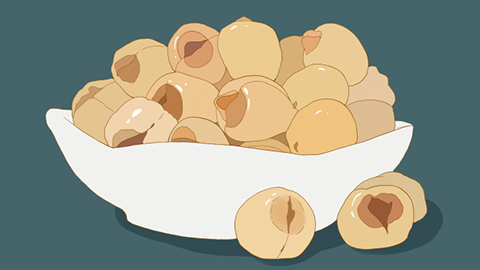What are the functions and benefits of lotus seeds?
Generally speaking, the effects and functions of lotus seeds mainly include nourishing the heart and calming the mind, strengthening the spleen and stopping diarrhea, benefiting the kidneys and consolidifying essence, enhancing immunity, and anti-aging. The specific analysis is as follows:
1. Nourishing the Heart and Calming the Mind
Lotus seeds contain various alkaloids, which act on the nervous system to exert a calming effect, relieving negative emotions such as anxiety and irritability. When insomnia, vivid dreams, palpitations, and uneasiness occur due to restlessness of the mind, moderate consumption of lotus seeds can soothe the mind and improve sleep quality.
2. Strengthening the Spleen and Stopping Diarrhea
Lotus seeds enter the spleen meridian, enhancing spleen and stomach functions and improving symptoms such as poor appetite and indigestion caused by weakness of the spleen and stomach. Its astringent property helps to contract the intestines, effectively managing persistent diarrhea and helping the gastrointestinal system return to normal function.

3. Benefiting the Kidneys and Consolidating Essence
Lotus seeds nourish the kidneys and enhance their consolidifying function, providing some regulation for problems such as seminal emission and spermatorrhea caused by kidney deficiency. People with kidney deficiency can incorporate lotus seeds into their daily diet to alleviate related symptoms.
4. Enhancing Immunity
Lotus seeds are rich in protein, various vitamins, and minerals such as calcium, phosphorus, and potassium. These nutrients support the immune system, helping to strengthen the body's resistance and reduce the occurrence of diseases.
5. Anti-aging
Lotus seeds contain abundant antioxidant components that can remove free radicals in the body, reducing damage to cells and delaying cellular aging. Long-term moderate consumption can help maintain a youthful state and exert certain anti-aging effects.
Although lotus seeds offer many benefits, excessive consumption should be avoided as it may burden the gastrointestinal system, causing bloating and indigestion. Individuals with spleen and stomach cold deficiency should cook lotus seeds thoroughly before consumption and avoid excessive intake. Special populations, such as pregnant women, children, and individuals with chronic diseases, should consult a physician before consumption to ensure safety. Additionally, high-quality lotus seeds should be selected during consumption, avoiding products that are spoiled or contaminated.





